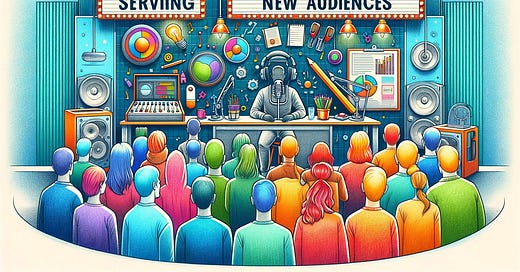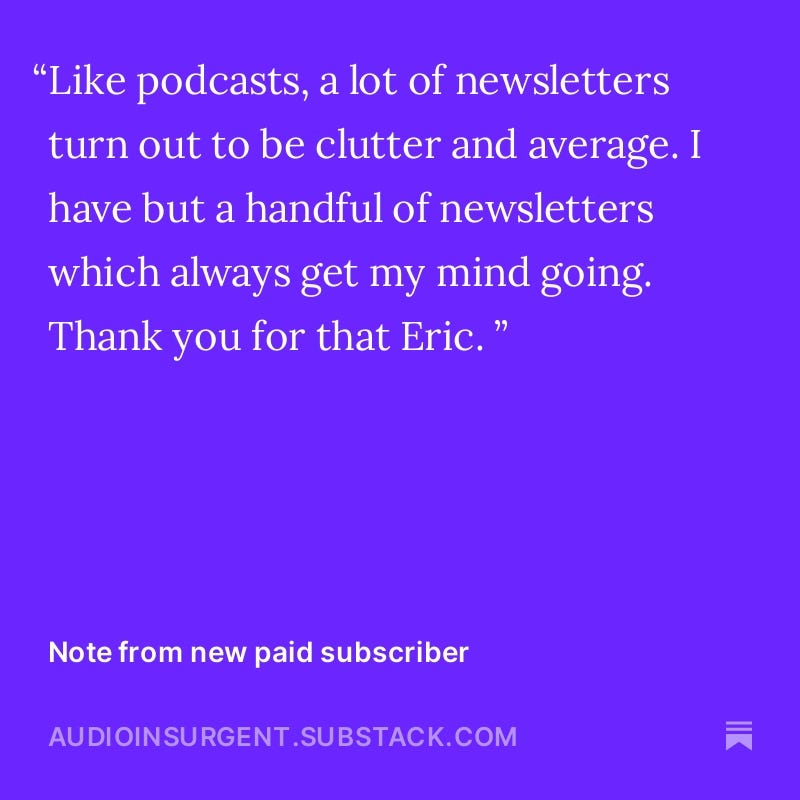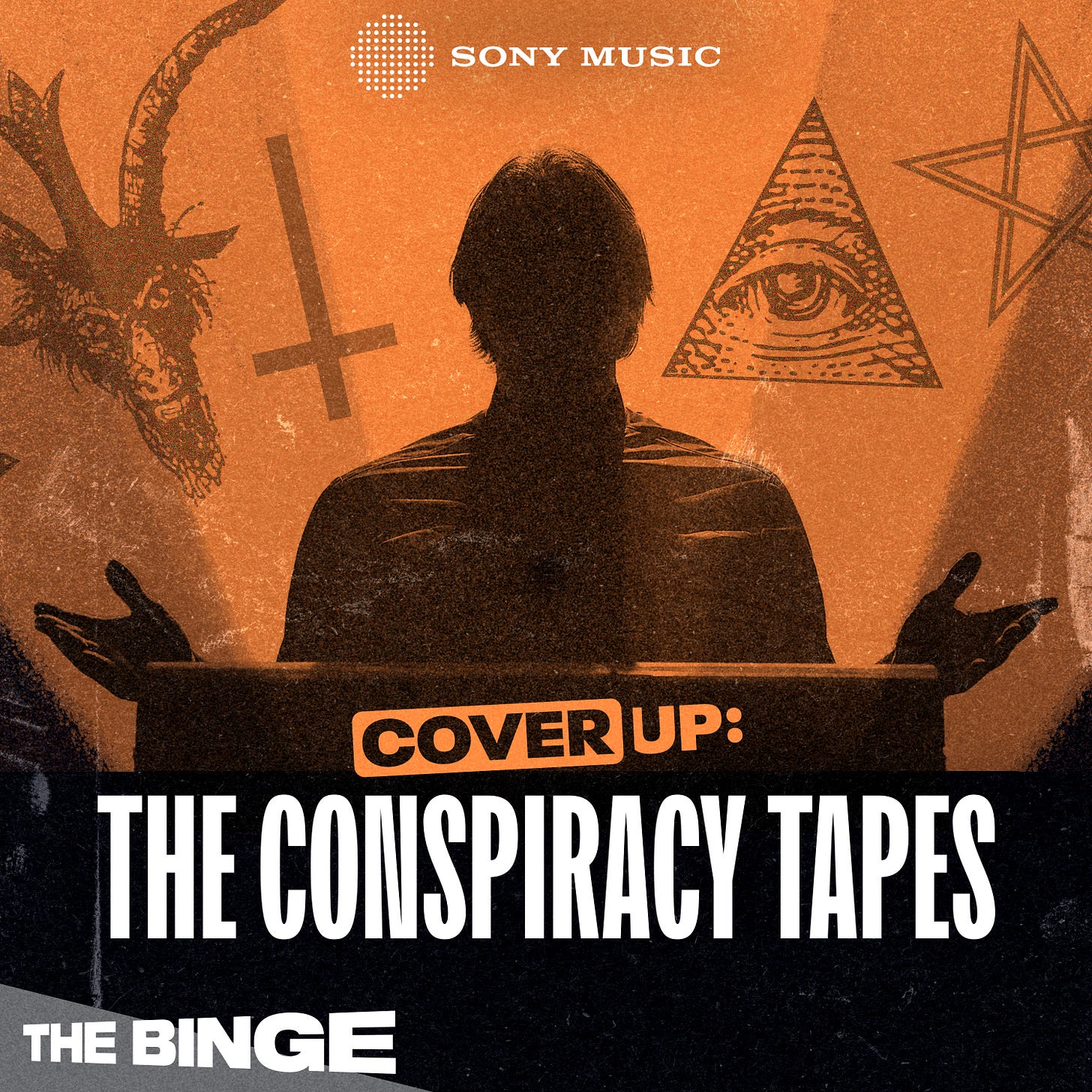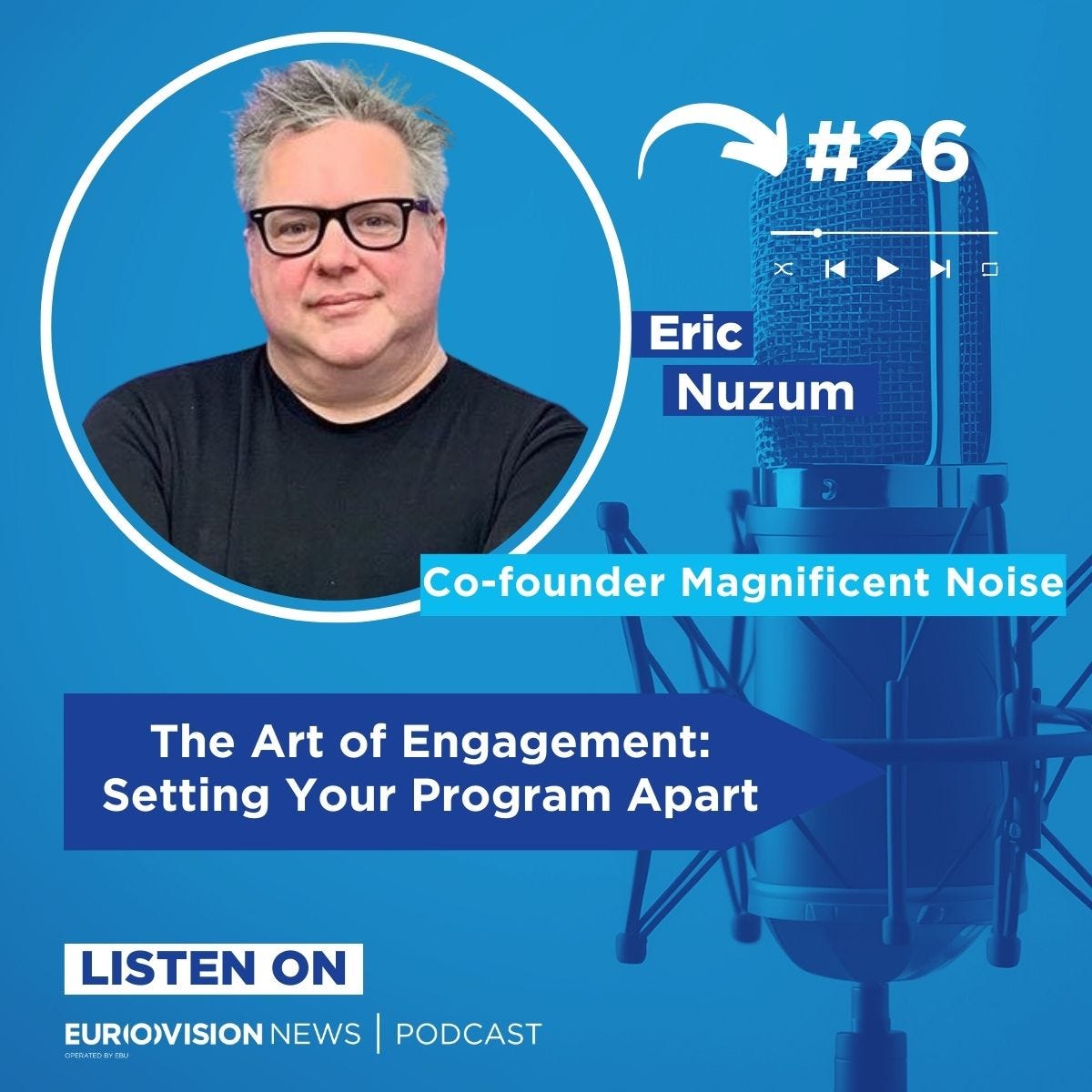If You Are Asking How To Get More People To Listen To What You Make Now…You Are Probably Going To Fail
Reaching new audience is about creating what THEY are interested in, not finding a way to convince them to listen to what you make now.
Welcome to Dispatch #62 of The Audio Insurgent.
Greeting from my flight home from Geneva, Switzerland–the Cleveland of Europe–where I just spent a few days. I came to speak at the EBU Media Summit and the main item below is a digest of what I said in the two sessions I spoke at, as well as the hallway conversations before and after.
And there are a number of smaller items after that, plus some links and a bit about my new show, which is launching this week!!!
People tell me they read this newsletter for a combination of “real talk” about podcasting and new ideas. The next few dispatches will be some really amazing thinking and ideas to share. But today is definitely “real talk.”
Let’s dive in.
[TODAY’S MAIN THING: SERVING NEW AUDIENCES] When I was asked to come speak at the EBU (European Broadcast Union) Media Summit, I was asked to talk about a primary concern on the minds of many public broadcasters in Europe: In a time of such tremendous change and competition, how can we reach more people with the services we produce today? We want to expand our audience and reach younger people, more diverse audiences, and those in our communities who currently don’t listen.
So I traveled 3,867 miles to answer this question.
And the answer is: you can’t.
The reason I can say this is that I’ve literally seen thousands of people state this as a goal, trying hundreds of different ideas, schemes, and solutions to make this happen.
And I can’t think of a single example where it has worked.
A primary reason why these efforts fail is because the question is backwards. The audience isn’t really in the conversation at all, let alone at the center of it, where they should be.
The future becomes a lot less elusive, frustrating, and overwhelming when you simply approach the problem from a different angle. Instead of focusing on what we can do to convince listeners to consume what we make now, instead ask what they need that our organization is uniquely qualified to address. What problem does our intended audience (and it needs to be a specific, intentional audience) have that we have a unique set of tools, assets, and talent to help solve?
Instead of asking this, too many people confronting existential strategy questions undertake a one-way virtue war. I hear in these discussions statements like, “Too much media is meant to foment anger and resentment.” Or something like “With the overwhelming prevalence of disinformation, we are a beacon of truth.” These statements signal that we are the good guys. We have the “truth.” And we should survive in the future–and audiences should come to us–because we are all these good things.
But that isn’t really what the audience is looking for.
This isn’t a way to win. Being righteous isn’t a strategy.
More on this after the jump…
Be like this new paid subscriber.
There are many very good places to hear today’s news about the podcasting and spoken-word industry. Here, I’m trying to do something different–create a space to understand several layers deeper, why things happen, and what the implications will be. This is a place for thought and analysis…plus my take on what it means.
If this is valuable to you, you can make sure it comes to you at least twice a month–and be among the first to read it–for as little as $5.
This reader switched to being a paid subscriber and seems to feel pretty good about their choice. And so can you.
I find it endlessly fascinating how often surveys that measure the distrust of media are quoted–yet very little attention is paid to the reasons why there is so little trust. And those “why” answers are often right there, embedded in those same survey results with the quoted numbers. The primary reason, in survey after survey, isn’t because of partisanship or bias or disinformation, it is because consumers don’t think the media understand them and their needs. They find the media elitist and untrustworthy because they don’t hear their own lives reflected in the news, which, to them, often feels like the powerful talking about the powerful–elites talking about the world of other elites. They hear that and say “That’s not for me.”
In our failure to recognize this–and to see the opportunity in it, we end up struggling. There are those who don’t see a way forward–sometimes because they need leaders to help show them. There are others who know the way forward–or at least the way they’ve chosen isn’t going to work–and they won’t be honest with themselves or those they work with and lead. For those folks, they are struggling because they have chosen to struggle. They resign to struggle because taking a different path forward feels scarier than the pain of the struggle.
Another thing that gets swept up in this struggle vortex is a disdain for current programming offerings and the audience you serve today. I recently was in a conversation with a radio service manager who told me, “No one I work with is in love with radio anymore–it is almost like they are embarrassed of it.”
I get this–and I think it is a mischanneling of energy. In most cases, despite challenges, radio still serves a lot of people–its reach is still pretty breathtaking. Will it survive long-term in its current form? No. But it never has–radio has been re-inventing itself for over a century. That will continue for years to come. Yet managers and creators tend to get caught in this feeling that they feel they’ll miss their future if they don’t shun their present and past. That’s pretty ridiculous and I’m sure the audience would disagree with that thinking.
So, in many ways, decline becomes a self-fulfilling prophecy.
Sometimes when I see leaders or creators stuck in that struggle loop, I just want to shake them and say, “You realize this is fixable, don’t you?” But that feels more like me imposing my ideas on others. It’s much better to find ways to help them see the value of other options.
I have to be honest, when I read over what I’ve written here, it sounds redundant–like I’m repeating myself. But everytime I publish something on change in radio and audio, lots of people respond and say they find it valuable. Perhaps you are one of them.
“Okay, great,” some of you are probably thinking. “That’s uplifting…so, what are we supposed to do?”
I think a lot of it has to do with simultaneously embracing that what you offer to audiences today probably still has a lot of value, but if you want to thrive in the future, you need to do some simple things to expand what you offer. It’s not about building more audience for current offerings. It's about offering multiple streams of programming that serve different segments of the community.
Start with this:
Identify the audience you wish to serve
Start a conversation with them to understand them and their lives.
Then ask yourself, with this mountain of resources, assets, connections, and tools we have at our disposal–what can we do to serve them?
Don’t think about formats, platforms, or roles. Identify a need they have that no one else is addressing–and give it a try. And despite the fear, it won’t hurt. In fact, it will feel really good.
In an episode of our series with Stanford Graduate School of Business, If/Then, one of the guests spoke about how everyone thinks strategy and vision are about defining some unreachable mountaintop. But most times, those who succeed don’t worry about that and simply figure out what they are really good at and expand out from there. Focus on the momentum, not following the pre-defined roadmap.
So…what are you really good at?
Two dispatches from now we’ll look at an incredible and inspiring idea and example of how to do this that you’ll be sharing with everyone you work with, I have no doubt.
[ONE MORE THING: THE CONSPIRACY TAPES] So I’ve been hinting about our new show. Now it is out and I can talk about it. As I mentioned in an earlier dispatch, if you’ve hung out with me over the last several years and asked what I’m working on that’s exciting to me, I probably would have started to talk about the Illuminati, conspiracy theories, and a guy named John Todd. This week, Sony Music Entertainment put out that story as a six-part narrative podcast called Cover Up: The Conspiracy Tapes.
And this story is unlike anything I’ve ever worked on before. It resets the bar for a bizarre story of someone I’m sure you’ve never heard of, but has impacted your life in surprising ways.
John Todd rose to prominence in the late 1970s claiming to have been a reformed witch and member of a mysterious group, called the Illuminati, that was executing a plan to take over the world. He toured the country speaking at evangelical churches to massive crowds who believed everything he said. John Todd was the originator or popularizer of almost every modern-day conspiracy theory you’ve ever heard, from the laughable to the chilling. And when you listen to the recordings of his talks today, you are shocked that anyone found this obviously disturbed man convincing. And hundreds of thousands of people did. And, for the first time, we tell the full story of who this guy is, what he claimed, and the just endlessly fascinating and jaw dropping and deeply, deeply troubling story of this guy. I know those claims get thrown around a lot, but you’ve never seen a story quite like this before.
You can read about it here or jump straight in and listen to it on the platform of your choice (though Apple Podcast listeners can subscribe and hear the entire series today). You can also hear the trailer too.
In an upcoming dispatch, Paul Murphy, the host, and I will talk about the series, the years-long drama to get it made, and how we approached telling this very complicated story.
[AND ANOTHER THING: REAL AND RELEVANT] Most people know James Cridland for his top shelf daily podcast newsletter, Podnews (the only media on podcasting that I’d consider a “must read,” including this newsletter). But most don’t know that James also writes another longer-form newsletter about international radio trends. It’s very impressive.
In his latest issue, he differentiates between “live and local” and “real and relevant.” It is a really fascinating and thought-provoking exploration and worth a few minutes to stick in your brain.
[AND YET ANOTHER THING: ME ON A PODCAST] While I was in Geneva, I guested on a podcast from Eurovision News (yes, Eurovision does more than host the annual song contest) where I talk about my history, my thoughts on where podcasting is today, radio, public service, and a bunch of other nonsense. You can listen here.
[AND ONE LAST THING: ANNA SALE ON CHANGE] There is a really interesting interview with Death, Sex, and Money host Anna Sale in CJR’s The Media Today column/newsletter about the transition from WNYC to Slate. It is well worth a read and really drives home the idea of taking a pause when confronted by unanticipated change.
Okay, that’s it for today.
Thousands of people read this newsletter without even a free subscription. If this was forwarded to you or you read this online, would you mind subscribing?
If you are a regular reader of The Audio Insurgent, I hope you’ll consider doing your part by supporting this work with a small donation. And if that’s too much, you are also always welcome to buy my book or (even better) buy me a beer.
Make great things. I’ll be listening.
--Eric







